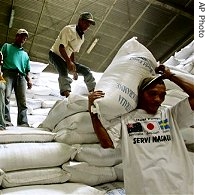2007年VOA标准英语-20 Percent of East Timorese Urgently Need Food(在线收听)
Dili, East Timor
02 July 2007
At least 20 percent of East Timor's people need food aid and are severely malnourished while 40 percent of the population is chronically malnourished. Aid organizations say donors must respond soon to avoid a crisis in the nation. VOA's Nancy-Amelia Collins in the capital Dili has this report.

East Timorese workers carry sacks of rice at a WFP warehouse in Dili(File Photo)
East Timor is suffering from food shortages caused by floods and plagues of locusts that cut the harvest of the country's most important crop, corn, by 30 percent this year.
Rice, cassava, and other cereal crops have also been hard hit. Aid officials fear the situation will worsen as heavy rains continue to cause floods in parts of the country.
The United Nation's World Food Program and the Food and Agricultural Organization say at least 15,000 tons of emergency food assistance is needed to avoid a crisis.
Tarek Elguindi, the WFP country director in Dili, says the situation is grave.
"About 200 to 220,000 people will be required to [be] assist[ed] October to March 2008. This is in addition to displaced people in Dili and other places, so it's a grim picture we have to face," he said.
Officials estimate around 10 percent of East Timor's one million people still live in refugee camps more than a year after fighting between security forces forced them to flee their homes.
Although around three thousand international peacekeepers have restored order, many of the displaced are either still too afraid to return home or had their homes destroyed in the violence.
All of this worries the WFP's Elguindi. He says donors must respond quickly or the situation will likely worsen.
"It is food, it is not like bank transfer you transfer in 48 hours. It is food to come here, [it takes] from three to five months to reach here," h' added. "So really we need it immediately, immediately."
The country's June 30 parliamentary elections could slow the government's response. Elguindi says political leaders will be busy forming a new government and will not focus on the issue of hunger.
"So we're talking about the end of the year and nobody will be around to take care of it and nobody will be experienced to deal with it and this is a concern," he said.
The head of the U.N.'s Mission in East Timor, Atul Khare, says there are concerns the food crisis could cause more violence in the country.
"If there is a shortage of food, it can on occasion lead to a lot of disenchantment and corresponding security challenges for this young nation. So we are concerned about it," said Khare.
East Timor, which became fully independent in 2002, is desperately poor and more than half the population is unemployed.
President Jose Ramos Horta, who was elected last month, says there is enough food for the next few months, but agrees more is needed to stave off starvation.
"We believe we have enough at the moment for the immediate needs for the next few months, but the same time as new needs arise because of the unexpected rains and floods, we are going to order more," said Mr. Horta. "We have our own resources, but also we have some significant resources from the consolidated appeal that we launched a few months ago together with the United Nations."
Last year's violence shattered the young nation. But the peaceful presidential and parliamentary elections over the past three months have raised hopes the country may finally be on the path to stability.
Most people here hope that will translate into a future where everyone will have enough to eat.